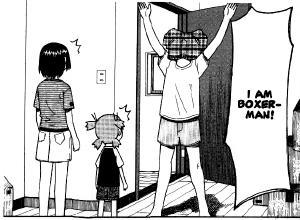Congratulations to Michelle (Soliloquy in Blue) Smith on winning a copy of Yumi Unita’s Bunny Drop (Yen Press)! Michelle described her favorite fictional father figure, Captain Kondo from Kaze Hikaru (Viz) thusly:
“He doesn’t have the elite background some of the samurai have, and might be argued to be a simple man, but he’s also an extremely good man with a profound devotion to his cause that inspires incredible loyalty in the men he commands. He was a strong father figure to Okita Soji when he first encountered the little boy, and Okita loves him so deeply that he’s sworn to follow Kondo into death and completely avoids any ties in the world that might prevent him from carrying through his wish. I challenge readers not to love Kondo, too, after they meet him.”
All the entries were great, and they ran a wide range of comic-book dads. Johanna (Comics Worth Reading) Draper Carlson cited Batman as “Grim and remote but reveals deep emotion at key moments.” Gosha Shtashel honored “Louis, father from Three Shadows [First Second] by Cyril Pedrosa, “ adding that the book itself is “the best comic I’ve ever read.”
 Laurianne Uy likes Van Hohenheim from Fullmetal Alchemist (Viz): “For all his talk about being a failure as a father, he managed to raise kids like Ed and Al who are strong, intelligent and morally upright. His absence for most of their lives is horrible but the fact that he feels regret about abandoning is family is still something I can empathize with.” Rijomu Sedai concurs that Hohenheim is kind of cool, but gives full props to FMA’s “Father,” “The big bad, ‘father’ to a bunch of inhuman monsters, not a shred of humanity in him.”
Laurianne Uy likes Van Hohenheim from Fullmetal Alchemist (Viz): “For all his talk about being a failure as a father, he managed to raise kids like Ed and Al who are strong, intelligent and morally upright. His absence for most of their lives is horrible but the fact that he feels regret about abandoning is family is still something I can empathize with.” Rijomu Sedai concurs that Hohenheim is kind of cool, but gives full props to FMA’s “Father,” “The big bad, ‘father’ to a bunch of inhuman monsters, not a shred of humanity in him.”
Sean (Kleefeld on Comics) Kleefeld cited Reed Richards of the Fantastic Four:
“But not the version that zapped his son into a coma back in the ’70s, or the current version who’s just kind of a rat bastard, but the version who actually tried to be a good father and uses his intellect to make life better for his kid. Even if he didn’t always quite ‘get’ the whole how-to-be-a-good-dad thing.”
Eric Rupe likes Yotsuba’s dad, and he’s seconded by Shelly in the comments on the call-for-entries post:
“I love his mix of bewilderment, playfulness, sternness, and above all acceptance and love of his strange daughter. I love how he encourages her to be herself, and how he eggs her on with blank-faced fabrications, and how he’s got a side of real exasperated ‘dad’ in him that we’d all have dealing with a child like her. I think perhaps he reminds me of what I love about my dad.”
 Back in the Marvel universe, Lorena (I ♥ Manga) Nava Ruggero favors Professor X: “I loved X-Men in high school and [he] always seemed like an interesting guardian for all the wayward mutants under his care.”
Back in the Marvel universe, Lorena (I ♥ Manga) Nava Ruggero favors Professor X: “I loved X-Men in high school and [he] always seemed like an interesting guardian for all the wayward mutants under his care.”
2terrible2kiss goes into the realms of unlicensed boys’ love for her picks:
“Y’know, I just love dads in yaoi. I dunno how many you’ve read, but aside from being the ultimate form of ‘man domestication’, there’s actually a lot of variety there too. I think you’d like Nobara by Kumota Haruko (he’s a ball of middle-aged moe. Affectionate but has been abandoned, along with his daughter, by his wife for being gay, he’s just trying to work hard and make a better life for her :D) and Tsubaki Biyori (her dad is so cool-faced, falling easily into his role as responsible parent, even though he’s a bit overwhelmed..since she keeps trying to run off when he’s not looking XD He wants to connect with old friends but acknowledes that he has different priorities now and has to put his daughter first.)“
 Gifted cartoonist Faith Erin Hicks is admirably honest in her nomination:
Gifted cartoonist Faith Erin Hicks is admirably honest in her nomination:
“Okay, just wanted an excuse to talk about Urasawa actually, because I love love love Kenji and Kanna’s relationship in 20th Century Boys. Kenji’s commitment to Kanna proves to me that he’s a hero underneath the loser facade, so he doesn’t need to go off fighting giant robots to prove it. God I’m not going to make it through 24 volumes of this… Seriously, the part where Kanna takes a bowl of udon to the Friends’ monument and wishes an absent Kenji happy birthday… why must you play so with my emotions, Urasawa?”
It’s hard not to find an intriguing family member in Fruits Basket, isn’t it? Shannon Weary cites “the subtly abusive Akira Sohma.
“Even though he is remembered by his daughter, Akito, as her ‘good father’, the reader can see how his seeing her less as a person but more as a label- ‘his special child’, a confirmation that his relationship with her mother was special, has damaged her. Her attempts to hold on to his memory were ultimately damaging- as she couldn’t move forward being obsessed with his belief that no one would leave her.
“Of course, perhaps this was due to his own fear of death, and loneliness. Since he’s a character that others talk about, but never speaks on his own, the reader can only conjecture, but told he was going to die young, he seems to fear dying alone. He begins a codependent relationship, which warns the readers of the pitfalls of the obsessive focus of love that is often pushed in manga.”
Back in the aforementioned comments thread, Matthew (Warren Peace Sings the Blues) Brady looked to Ogami Itto from Lone Wolf and Cub (Dark Horse): “Probably not the best father, but quite possibly the awesomest.”
 Margaret cited Kippei Katakura in Yoko Maki’s Aishiteruze Baby (Viz).
Margaret cited Kippei Katakura in Yoko Maki’s Aishiteruze Baby (Viz).
“Kippei is a seventeen-year-old high school playboy who is suddenly saddled with the role of ‘Mr. Mom’-style chief caregiver when his recently-widowed aunt simply takes off, leaving her five-year-old daughter Yuzuyu behind. The Katakuras, who have apparently never met the child before, reluctantly decide to take her in, and Kippei’s bossy older sister assigns him to take care of the kid because a) ‘you’re sweet to girls’ and b) she hopes Kippei’s having to babysit a five-year-old will have a dampening effect on his frenetic social life and tendency to attract annoying female stalkers to the house.
“This arrangement actually works out surprisingly well. Although Kippei is initially less than thrilled to be handed such a major responsibility, he likes Yuzu, and his easygoing charm enables him to bond with her almost immediately. But good intentions aren’t enough. The previously undomesticated boy quickly realizes that half-measures like hastily buying his little cousin a pre-packaged lunch at a convenience store on the way to kindergarten can have traumatic consequences in a milieu where bringing in an amateurish or non-homemade bento is perceived as a symptom of a shamefully inadequate family. Various comical and touching misadventures in lunchmaking ensue, ranging from Kippei’s well-intentioned maiden effort of a single ridiculously oversized riceball to his awkward attempt to research what little girls like to eat for lunch by consulting his secret crush Kokoro and her friends.”
Thanks to everyone who entered!


